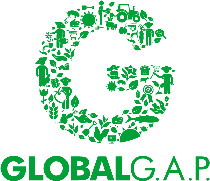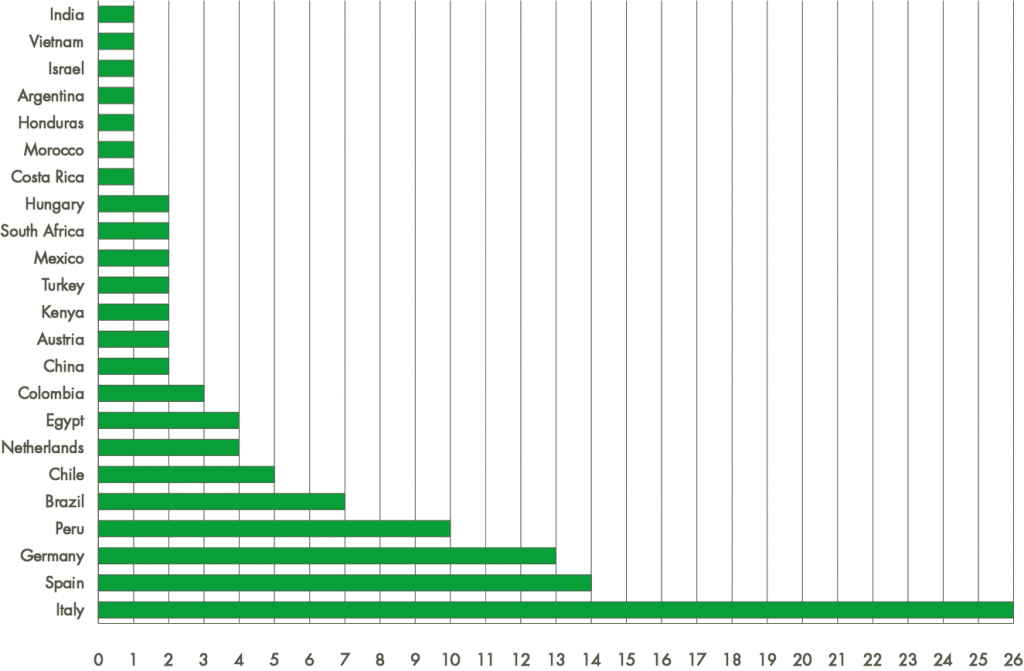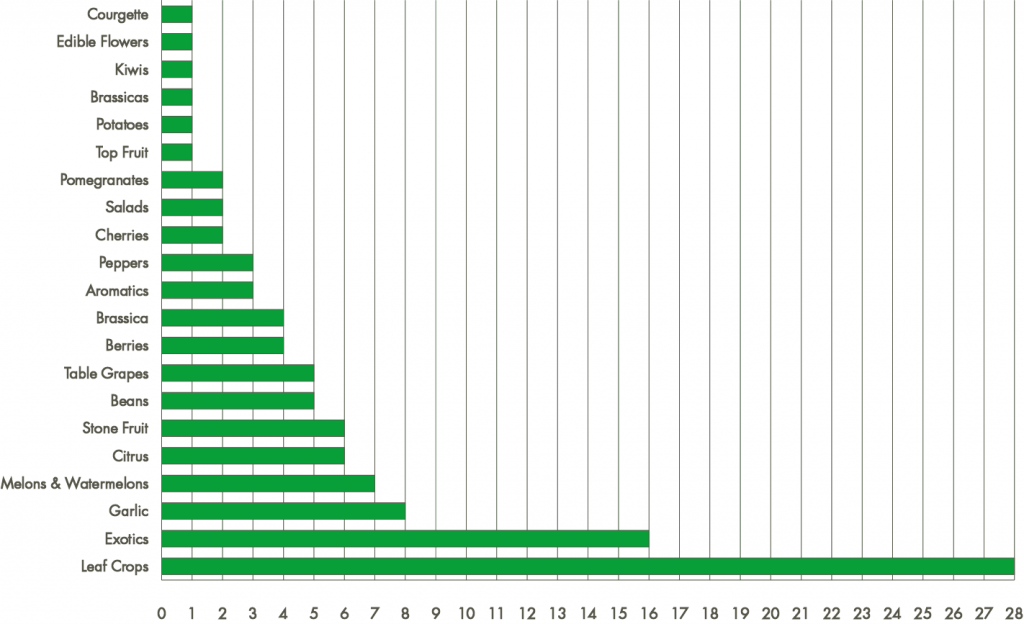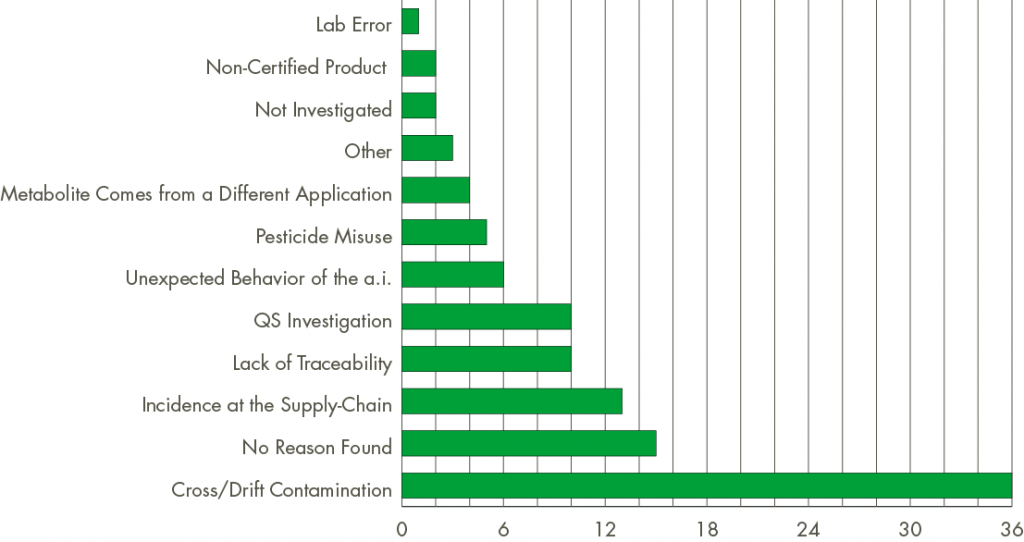Integrity Report 2019
WELCOME LETTER
Training
Assessment
Brand Integrity
Complaints Management
Customer Support
The Future
COMPLAINTS MANAGEMENT
Fast and thorough response system
Complaint Investigation
Complaints regarding a breach of standard requirements by GLOBALG.A.P. system users – including those related to maximum residue limits (MRL) – can be made via a complaint form on the GLOBALG.A.P. website. Some complaints are also received directly from stakeholders or the media. Once received, the Complaints Management Officer records, analyses, and investigates these complaints.
If potential non-compliance of the standard requirements by a certified producer, producer group, or company is detected, GLOBALG.A.P. requires the corresponding certification body and certificate holder to refute the claim by verifying and providing evidence of compliance with the GLOBALG.A.P. Standard. Certification bodies investigate the complaints through document review and, if needed, unannounced assessments. CBs must then report all findings and actions taken by a defined deadline.
If deemed necessary, the Certification Integrity Team will perform targeted Integrity Assessments for onsite investigation and follow up. Complaints information is therefore shared with the Certification Integrity Team to facilitate the selection and scheduling of Integrity Assessments.
A total of 244 complaints from 54 different countries and 81 different crops were processed in 2019
Breakdown of Complaint Categories in 2019
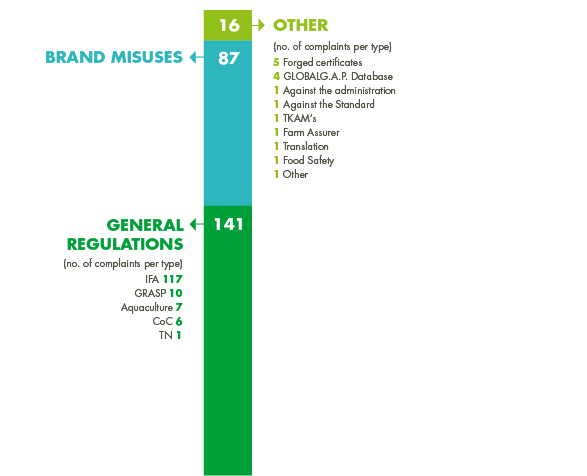
RESIDUES MONITORING SYSTEM
Complaint Investigation Process
GLOBALG.A.P. has a dedicated team of experts to investigate complaints relating to minimum residue limits (MRL). The MRL complaint process is as follows:
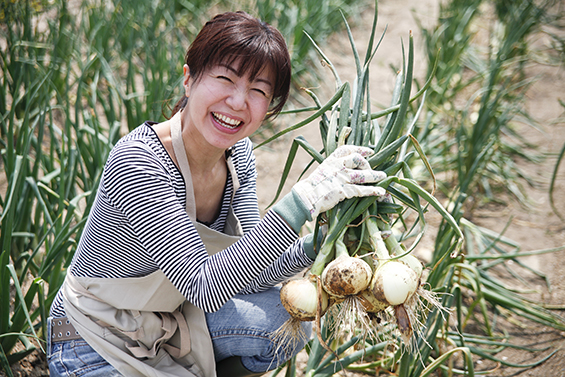
- Complaint is received by GLOBALG.A.P.
- Complaint information is checked (producer status, analysis report, traceability info, etc.), registered in the complaint management system and sent to the relevant CB.
- The CB investigates the complaint and sends the conclusions to the GLOBALG.A.P. technical team:
- Phase one: The CB performs a documentary check and sends GLOBALG.A.P. information on the last assessment carried out on the producer.
- Phase two: In most cases an unannounced audit is carried out at the producer premises. The situation is investigated on site.
- Additional GLOBALG.A.P. investigation:
- Sampling by food experts: In some cases, GLOBALG.A.P. commissions an independent expert to check traceability and take a sample at origin. The sample is tested in an accredited laboratory.
- Chain of Custody: In some cases, a GLOBALG.A.P. expert contacts several agents in the supply chain to verify or complement the investigation carried out by the CB with the producer.
- GLOBALG.A.P. experts cross-check and challenge information received. In most cases the CB will provide the clarification which is needed. Sometimes additional investigations need to be carried out.
- The GLOBALG.A.P. Complaints Management team summarizes the investigation in a 1-2-page report, which is sent to the plaintiff.
- If the GLOBALG.A.P. technical review identifies a potential risk, the information is passed-on to the Certification Integrity Team.
In 2019, the highest number of investigations were in Italy (26 cases), Spain (14 cases) and Germany (13 cases).
Status of Complaints Received
At the end of 2019 there were 18 open investigations to be resolved in 2020.
An investigation often lasts for two months, but in some cases it can last much longer. In 2019, the main reasons for a longer duration continue to be the same as those observed during the past years:
- Chain of Custody problems: The information provided with the complaint does not relate to the producer. In most cases the product has been packed by another operator or re-packed at destination. The supply chain must be investigated to find the source of complaint.
- The CB has no auditors in country where the producer is located, and long-distance travel arrangements are needed.
- The CB auditors’ do not have space in their schedule or there are logistic problems and an unannounced inspection can take several weeks to be organized.
- The CB detects non-compliances during the unannounced investigation and – in accordance with the General Regulations – the producer has 28 days to submit corrective actions and the CB another 28 days to take a certification decision.
- GLOBALG.A.P. challenges the investigation outcome and the CB needs to re-orient the investigation and continue with new investigation.
During 2019, the most frequent sources of complaint were leaf crops (28 cases), exotics (16 cases), garlic (8 cases), and melons & watermelons (7 cases). Exotic fruits include a wide variety of products.
MRL Incidences in 2019 According to Category
Most of the MRL exceedance cases detected in 2019 were not due to agricultural practices related to certified producers, proving that the system is improving year by year. Instead they were due to adjacent producers, traders, and re-packers. Producers and CBs are now aware of the consequences of drift contamination from adjacent producers and are working to minimize it. Concerning traders and re-packers, there is nothing producers can do. The key is to motivate retailers to demand Chain of Custody certification along the supply chain.
Normally drift from an adjacent field. In most cases the adjacent field is not GLOBALG.A.P. certified. Raising awareness amongst certified producers about this problem and the need to implement preventive measures (barriers, separations, exchange of information with neighbor, etc.) continues being a priority task.
The producer is QS-GAP certified. QS undertakes the investigation by taking a second sample and if result is acceptable the investigation is closed. No information about the root cause of the problem is provided.
This category includes issues such as GGN misuse by a non CoC-certified re-packer or operator in the chain.
The most frequent cause in this category is the low degradation-rate of pesticides.
Problems linked to PO and/or PP were identified as the source of the incidence. Only cases affecting PP/PO registered producers. Common examples are mixing non-certified products with certified products or a poor segregation system which could have led to a mixing of the products.
The CB investigation could not identify the cause of the reported exceedance. Also included in this category are cases in which a plausible reason was found but could not be demonstrated to be the origin of the exceedance. In these cases, the producer is requested to take appropriate measures in order to sort out the detected weak points. Some cases in which no reason was found are thoroughly reviewed by the MRL technical team in order to decide if the case should be forwarded to the Certification Integrity Team.
To be able to investigate an MRL case, it must be possible to trace information along the supply chain and match the analyzed product to a specific batch from the producer. In some cases, this is not possible. therefore, reliable traceability information cannot be obtained.
The most common issue included in this category is using pesticides with very low MRL in the EU and not increasing (or not increasing enough) the label PHI or not complying with the PHI. Also includes the application of non-authorized active ingredients and others similar causes.
All the cases included in this category are due to phosphonic acid residues not coming from a fosetyl-Al application but from another
Common issues include labeling with incorrect GGNs, producers labeling non-certified products with a GGN, and non-authorized use of the GGN.
One case in 2019 could not be investigated because there was no evidence enough to prove that the product came from the producer.
One case in 2019 involved a problem with the pesticide application machinery. In another case, the producer was AMA certified. AMA is to undertake the investigation (taking a second sample and if result is ok investigation is closed). No information about root cause of the problem.
The affected product was not sold as certified by the producer. Only verifying that the producer is under certification is not enough. The product must be clearly indicated as being from a GLOBALG.A.P. certified production process on the invoicing/trading documents.
